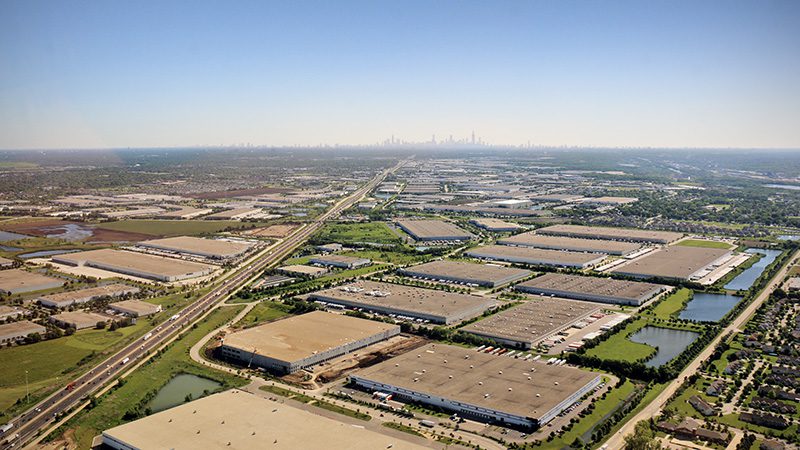February 2024
NAI Hiffman expert predicts a strong new normal in Chicago’s industrial sector

Reshoring. The rising demand for cold storage. And Chicago’s status as the hub of the country’s warehousing and distribution network. These are all reasons why Nick Schlanger, director of research services for Oakbrook Terrace, Illinois-based NAI Hiffman, is predicting an even stronger year for Chicago’s industrial sector in 2024.
RE Journals recently spoke with Schlanger about what he expects to see when it comes to the demand for industrial space and sales in the Chicago market this year. Here is some of what he had to say.
Now that the Federal Reserve has brought some stability to the interest-rate environment, do you think we’ll see more sales activity in the Chicago industrial market throughout 2024?
Nick Schlanger: I definitely think we are going to see a much stronger industrial sales year in 2024 than we did in 2023. There is a lot of dry powder on the sidelines. Large institutional investors are eager to deploy capital.
I anticipate several rate cuts from the Fed throughout 2024. The second half of the year is when some of these economic changes will start to manifest and we will start to see some of the activity really pick up. Between all the dry powder that is waiting on the sidelines, the rate cuts we expect to see and the amount of interest in the industrial capital markets, I expect to see more industrial sales in 2024.
Despite the challenges that the sector has gone through as interest rates rose last year, is industrial still the preferred commercial asset class for investors?
Schlanger: Industrial has very clearly supplanted office and multifamily as the premier asset for the large institutional investors. Something that I have been looking at is the rise in industrial valuations. The valuations for industrial buildings are at an all-time high. I think that there might be some discrepancy between buyers and sellers in terms of where sellers want to set their pricing. That held us back a bit in 2023. We did see significant growth in the Chicago market in 2023. But the record years of 2021 and 2022 that we saw following COVID? Those are gone. What we are heading to now is a strong but new normal for the Chicago market.
It’s important to keep things in perspective on where Chicago is in the national picture. Nationally, we are never going to keep up the pace that we saw during the last three years. But our market has clearly established itself as one of the, if not the, preeminent industrial market in the country. In the fourth quarter of last year Chicago had the third-highest amount of net absorption of any market in the country. It did that while maintaining the lowest vacancy rate of any of the top-10 largest industrial markets. While industrial market fundamentals might have softened, the numbers show that Chicago continues to perform. I anticipate it will stay that way.
Leasing activity remained strong in the Chicago market throughout 2023, even with economic uncertainty. What are some of the reasons for the strong demand we continue to see for industrial space in the Chicago market?
Schlanger: It starts with our transportation infrastructure. We have great access to rail. O’Hare is one of the largest airports in the country. And we have a great location in the center of the country. Chicago really is the center of transportation and logistics in America.
In 2023 we saw 44 million square feet of new industrial leases signed. In 2021 and 2022, we saw more of an average of 75 million square feet of industrial leases each year. But there are some trends that should bode well for Chicago.
In 2024, we will see even more of a rise in cold storage. There is a notable increase in the demand for cold-storage facilities in the Chicago market. That is a product of the rapid growth of online grocery stores and meat distributors and their need for efficient distribution channels. COVID accelerated this trend with online shopping. Chicago is well-positioned to perform well in the cold-storage market.
Then there is the reshoring moving bringing production activities back to the United States. This has been influencing demand in Chicago over the last few years. We’ll see even more of an uptick in reshoring in 2024. Companies are looking to reduce their dependence on long international supply chains, particularly now that we saw the disruption that resulted during COVID.
Now we have the war in Ukraine, the conflict with Israel and Hamas and attacks on key shipping routes. These ongoing events are forcing business leaders to rethink their macroeconomic strategies. I feel that we are going to see that play out and bring additional reshoring to Chicago. Reshoring creates more demand for industrial space, particularly for manufacturing, which has lagged the distribution and logistics sector.
Do you expect leasing activity to remain strong this year in Chicago’s industrial market?
Schlanger: I do. One factor to keep an eye on is a negative trend in 2023 that might turn positive in 2024? Big-box industrial leasing.
I consider big-box industrial to be anything 200,000 square feet, Class-A and built after 2000. At the onset of the pandemic, big-box industrial was red hot thanks to the rise of ecommerce. We saw crazy demand for these large warehouse and shipping centers. The volume of big-box leases has since moderated significantly. Last year, leasing activity in this part of the market was down 40% from 2022 and 2023.
Nationally, we are seeing a shift from these large singular hubs that are located around major population centers. With the complexity of today’s shipping, we are seeing a shift to a more complex network of local distribution centers. There is a growing need for last-mile, same-day delivery. Instead of looking for a 500,000-square-foot building, more companies are going with smaller warehouses or distribution centers to get their products to their customers.
Last year was a record year in the Chicago industrial market. We saw almost 40 million square feet of new industrial product come to the market. I think these new spaces will lease very well this year as companies look for smaller facilities that will help them get their products to their customers faster. We have these great interconnected highways.
About 80% of the inventory that delivered in 2023 was on a speculative basis. Even though the market has slowed, developers are confident that they will get this space leased. Record new deliveries and new availability should drive leasing this year.
There won’t be as much industrial space delivered in the Chicago market this year, right?
Schlanger: Construction starts slowed in the second half of 2023. While we still have 16 million square feet in the pipeline, that is a far cry from where we were a year ago. The cost of capital is making it harder to go forward with these spec projects. If you have a build-to-suit with a tenant committed, any developer can figure out a way to make that happen. But with a slight cooling in market fundamentals in 2023, developers were hesitant to break ground on a new project without committed tenants.
There isn’t a massive amount of new inventory breaking ground for major tenants to lease over the next two years. As that inventory stabilizes and we see the pipeline slow, competition will ramp up. Tenants might get more aggressive when it comes to finding new space. There might be a higher sense of urgency for tenants who want new, modern space. That will drive leasing.
Are there any Chicago submarkets that you think will perform especially well in 2024?
Schlanger: It should be the usual suspects. The I-80 and I-55 corridors have stood out for the last couple of years in leasing activity and occupancy gains. The O’Hare submarket has long been one of the premier industrial markets in the country. O’Hare did not lead the Chicago area last year, but I think we’ll see it back on top in 2024.
The I-80 Joliet market stands out for me. There was a lot of new construction in that submarket that has leased well. In 2023 alone, we saw Target, GE and Unilever all leasing very large new-construction spaces in that submarket.
Click here to read the full article in RE Journals.
About Hiffman National:
Based in the Chicago area, with an additional five regional hubs and 30 satellite offices, Hiffman National provides superior property management, project services and accounting services to a diverse portfolio including office, medical office, retail and industrial properties nationally. The firm’s comprehensive property management platform and attentive approach to service contributes to client NOI and has helped the firm to more than double in size in five years. Hiffman National is an award-winning company with more than 250 employees strategically located throughout North America.
About NAI Hiffman:
NAI Hiffman is one of the largest independent commercial real estate services firms in the US, with a primary focus on metropolitan Chicago, and part of the NAI Global network. We provide institutional and private leasing, property management, tenant representation, capital markets, project services, research, and marketing services for owners and occupiers of commercial real estate. To meet our clients’ growing needs outside of our exclusive NAI Hiffman territory, we launched Hiffman National, our dedicated property solutions division, which provides property management, project services, and property accounting services across the country. NAI Hiffman | Hiffman National is and award winning company headquartered in suburban Chicago, with more than 250 employees strategically located throughout North America.


